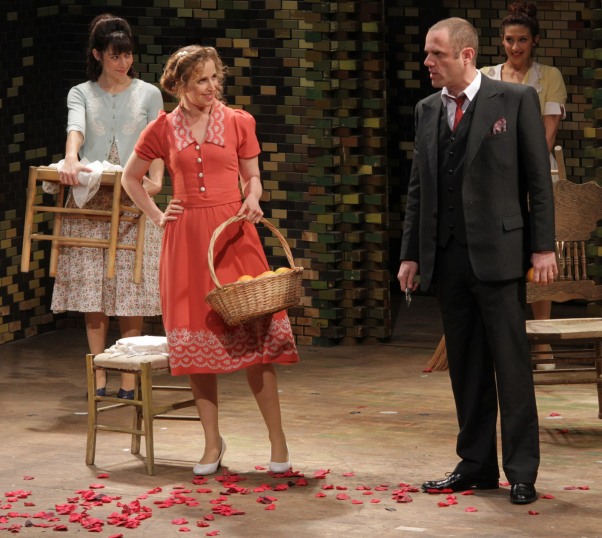
Survival of the wittiest seems to be the decree of the day in our media-determined environment. Actions and events take on shape and meaning through words and images disseminated, almost instantly, throughout the digital universe, in 140 characters or more, with links to video that appear to confirm their verity for any viewer.
In this context, Shakespeare’s Much Ado About Nothing acquires a contemporary edge utilized to full advantage and fun in the Beer Sheva Theatre production, translated by Dori Parnes and directed by Ido Riklin. The play of power and the power of speech and spin are central forces in this comedy centered on two pairs of lovers: the witty Beatrice and Benedick, who profess their disregard and disaffection most eloquently; and the young Hero and Claudio, struck speechless time and again, falling prey to the schemes of more sinister players in this game of words and wit.
On the surface, the action is situated between two wars, and the contrast between them – the real war, that has ended with no casualties “of name” just as the play opens, and the “merry war” of words between Beatrice and Benedick. Yet, as Ricklin’s staging reveals, the war is never really over, the struggle for control and domination is always there, beneath the surface, and the war of words can be all too real. Shakespeare set the play in Messina, Sicily, and Ricklin has moved the action to the not so distant past, the wars from which our heroes return are Mafia wars. Family, loyalty and honor, take on a darker subtext in this production, and provide an intriguing context and substance to Don John’s sinister plans to dishonor Hero and wound Claudio.
Riklin’s sense of freedom with Shakepeare’s text – reforming the walk-on role of Ursula into a strong matriarchal figure with warmth and spark in Zaharira Charifai’s wonderful performance, and adding snatches of song and text from other plays – is well-matched with Dori Parnes’ translation. Parnes is a treasured translator who not only knows his Shakespeare (check out his site for translations of Shakespeare) but is a scholar with a sense of sure-footed linguistic fun; he really makes this play his playground. Even the most loyal Shakepeare lover (Midnight East confesses freely) will soon be seduced by the pleasures of this production.
Words tease out the truth of the underlying affection between Beatrice and Benedick, as the peacetime pastime of gossip entangles the pair in the thread of romance. Micha Selektar has all the allure of the sexy, successful man who skillfully avoids commitment, eventually succumbing with comic charm, and Shiri Golan gives as good as she gets in the war between the sexes, eschewing feminine modesty for a bawdy barbed tongue and tough girl attitude belied by the vulnerability of her gaze. The code of guns and brute force dominates as boys will be boys – Benedick pierces an orange with a knife, sucks out the juice then tosses it casually back into Beatrices’ basket, shoves Claudio’s head into a basin of water in boisterous fun and generally swaggers with bravado, joining the men at the festive dinner table, while the women deal with the dishes, and dish the dirt.
Hiding her heart behind a screen of words, boldly drinking straight from the bottle behind the scenes in the kitchen, Beatrice ultimately emerges as one of Shakespeare’s strongest female characters. Yes, Benedick eventually stops her mouth with a kiss, but not before she has moved this man to cross over to the women’s side at the crucial moment. Selektar and Golan are wonderful as romantic heroes for a cynical century.
Michael Aloni is quite touching as the callow Claudio, inviting empathy and a good measure of forgiveness for the mistakes of this youth. Yossi Zabari is brilliant as Dogberry [the name of the character has been changed in translation to Dobdevil, which sounds to this Hebrew-speaking ear like something between bear (dov) and idiot (debil)], bringing a local flavor to his portrayal of the comically inept watchman who accidentally saves the day.
AYELET DEKEL






Comments are closed.